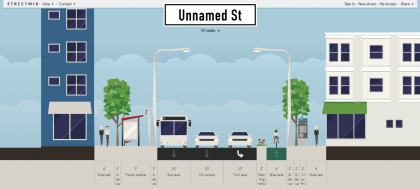Here’s the bike news that caught our eyes this week:
Street planning tool: This amazing interactive street design tool, designed for touchscreens, is perfect for quickly visualizing different ways to allocate road space for a given width.
Booby-trap your bike: Forgot your bike lock? The next best thing might be to foil a would-be thief with one of these quick mechanical modifications.
Wall fixture: A wall-mounted steel loop for bike locking is available from a British company for less than $100.
Bend organizes: The new advocacy group Bend Bikes had its first community outreach forum last month.
Bike lane language: Just before it became clear that Rahm Emanuel wasn’t going to meet a target of 100 miles of protected bike lanes in Chicago by 2015, his department of transportation changed its internal definition of “protected bike lane” to include bike lanes with painted buffers.
Cardboard cop: In the other Portland, a cardboard cutout of a police officer near a bike rack has helped cut bike theft 67 percent. It may be more about the reminder than the illusion: a new U.K. study finds similiar results from posters of peering eyes.
Merkel at Eurobike: The German chancellor visits the big trade show of a €50 billion business that “is expected to grow significantly in the years ahead.”
Concert bike valet: Want to save on parking costs, music venues? Offer bike valets.
Dirty electric cars: A former plug-in advocate makes the case that electric cars aren’t greener, especially compared to non-car alternatives.
Carbon tax works: British Columbia’s five-year-old carbon tax has cut emissions (including a 17 percent drop in personal fuel consumption) and let the government lower other taxes without harming the provencial economy, a new study has found. Oregon is considering a similar program.
Overstaying welcome: A Vancouver BC property that touts its “green commuting” program threatened to confiscate a bike commuter’s vehicle after she violated an umarked 15-minute limit on a bike rack. Longer-term parking would endanger “the professional image of the building,” the company wrote.
Too many bikes in Europe? There’s no denying that European streets are short on space. The question is whether bikes or cars are better ways to use the space there is.
Roman road: The bike-loving mayor of Rome is converting a street near the ancient Colosseum into a pedestrian-only space.
$21 per commute: That’s the benefit to the Australian economy every time somebody bikes 20 minutes to work, the Australian government says. (Numbers here.) That’s why they’re now requiring “safe separated cycle ways” on every future urban road project.
Federal green light: Looks like the Federal Highway Administration is finally preparing an official endorsement of protected lanes.
Safe passing: Austin police are enforcing a law that requires three feet of clearance when passing a person on a bike, on foot or at a construction site.
License requirement lightened: In Los Angeles, driving without a license is no longer a criminal offence, just a traffic infraction. It’s a “quality of life crime,” the deputy chief explains.
Misdemeanor DUI: “In Eugene, You Can Kill a Pedestrian While Driving Drunk and be Charged With a Misdemeanor,” reports We Bike Eugene.
Citi Bike competition: A price battle between a local rental shop and NYC’s bikesharing system shows how one specializes in recreation, the other in transportation.
Bikes don’t hurt business: Two commercial districts in Seattle that swapped auto parking for bike lanes saw retail volumes increase or stay flat.
What caused the Dutch biking boom? A mass protest movement in the 1970s against road casualties led to dedicated bikeways, which made biking normal. Smart BBC analysis.
NYC protest: Last week, 100 New Yorkers gathered ouside City Hall to resist a string of pedestrian fatalities, carrying signs that said “Not one more killed.”
“Deadly weapon”: A New York Post columnist demands safer streets, too.
Speed is good: Breaking the law is good for New York’s economy, says AAA.
If you come across a noteworthy bicycle story, send it in via email, Tweet @bikeportland, or whatever else and we’ll consider adding it to next Monday’s roundup.

